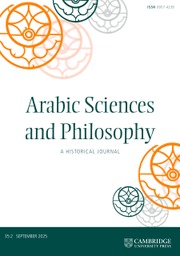No CrossRef data available.
Article contents
THE SCIENCES OF THE ANCIENTS AND THEIR DIVISIONS AQSĀM ʿULŪM AL-AWĀʾIL: A TEXT ATTRIBUTED TO AVICENNA, AN EDITION WITH A BRIEF INTRODUCTION
Published online by Cambridge University Press: 23 August 2021
Abstract
The famous philosopher and scientist Abū ʿAlī b. Sīnā (d. 428/1037) had an exceptional command of all the subjects on which he wrote. He is especially known for his many writings in logic, philosophy, and medicine. His influence was such that even in Europe, his works on physics, metaphysics and medicine in particular, were widely studied until the beginning of modern times. A keen mind, he had a full understanding of the inner structure of the Islamo-Hellenistic tradition that he perpetuated and in places helped to develop and reshape. This is not only borne out by his many writings, but in some instances also by his explicit accounts of the sciences and their divisions. This article contains an edition of one such account, of which only two copies have been identified so far. It will be argued (against Biesterfeldt) that the text in question is likely to have been written in Bukhārā when Avicenna was still in his early twenties. Moreover, it will be shown that it could very well be that the text was actually copied from his famous Al-ḥāṣil wal-maḥṣūl (Harvest reapings), a philosophical encyclopaedia in twenty volumes long since lost. The absence of algebra and a philosophical rather than a religious foundation of the sciences finally, are important clues to Avicenna's perspective on the rational sciences early in his career.
Résumé
Le célèbre savant Abū ʿAlī b. Sīnā (m. 428/1037) montrait une maîtrise exceptionnelle de tous les sujets qu'il traitait. Il est surtout connu pour ses nombreux travaux en logique, en philosophie et en médecine. Son influence est telle que même en Europe ses travaux (en particulier en physique, métaphysique et médecine) ont été étudiés jusqu’à l’époque moderne. Il comprenait parfaitement la structure interne de la tradition gréco-arabe ; il l'a transmise et a aidé son développement et sa transformation. En témoignent ses nombreux travaux, mais aussi plusieurs exposés explicites quant aux sciences et à leurs divisions. Cet article contient l’édition d'un tel exposé, dont deux copies seulement ont été identifiées à ce jour. On expliquera (contre Biesterfeldt) que le texte en question a probablement été écrit a Boukhara quand Avicenne était encore jeune. De plus, on montrera que le texte peut très bien dériver de son célèbre Al-ḥāṣil wal-maḥṣūl, une encyclopédie philosophique en vingt volumes, perdue depuis longtemps. L'absence de l'algèbre, et un fondement des sciences plus philosophique que religieux, sont des indices importants révélant le point de vue d'Avicenne sur les sciences rationnelles à une période précoce de son activité.
Information
- Type
- Research Article
- Information
- Copyright
- Copyright © The Author(s), 2021. Published by Cambridge University Press

